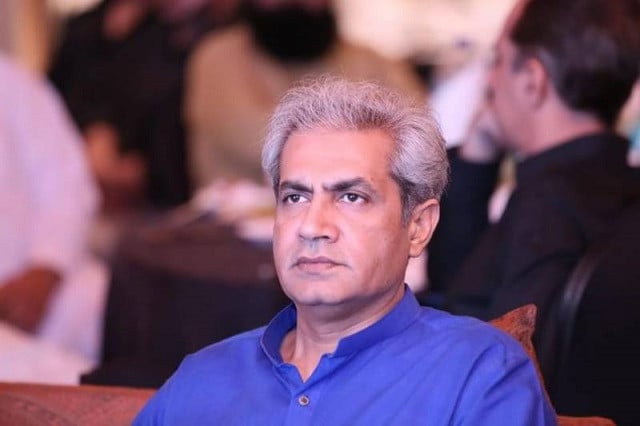Cheema to move SJC against LHC judge
Governor says Justice Jawad made ‘unconstitutional decision’ of ordering NA speaker to swear in Hamza

Punjab Governor Omar Sarfraz Cheema on Thursday announced that he would file a reference against the Lahore High Court’s Justice Jawad Hassan for his “unconstitutional decision” of ordering National Assembly Speaker Raja Pervez Ashraf to administer oath to PML-N leader Hamza Shehbaz as the chief minister of the province.
"I will file a reference in the Supreme Judicial Council [SJC], where it will be written that only the president and the governor can administer the oath," he said while addressing a news conference at the Governor’s House in Lahore.
The governor claimed that Pakistan's largest province was being held hostage by 'unique favourites, adding that courts, parliamentarians and political parties had a role to play in this crisis.
"The situation of the Punjab Assembly in the recent past has turned into a major constitutional crisis," Cheema maintained.
"The decision to administer oath was made by betraying the judiciary.”
He maintained that one constitutional body could not interfere in the matters of other constitutional bodies. “The judiciary is bound not to interfere in matters of parliament.”
He added that he would meet President Arif Alvi and army chief Gen Qamar Javed Bajwa on Friday (today) for this purpose.
Turning to the uniform again as has been the precedence in Pakistani politics, the governor wrote in an early morning tweet that if the army chief provided him with only one warrant officer and four soldiers, then he would personally arrest and imprison the “unconstitutional and illegal” chief minister.
Read: Hamza finally sworn in as Punjab CM
“If everyone accepts the Hamza Shehbaz ‘formula’ for becoming the chief minister in Punjab, the other provinces should start worrying for themselves.”
He further wrote that if those who had torn up the Constitution and law by force were protected, then anyone could take over a constitutional office in the same way in the future.
Cheema claimed he had always demanded a "neutral umpire" in his 26-year-long political career. He added that a "neutral umpire" had maintained the same rules for both sides, otherwise, they could not be called "neutral" and the game would not be fair.
"I have clarified in my statement what kind of intervention I expect and what is needed. I would have appealed to the public if I wasn't the governor. Political parties have always demanded the [military’s] 111 Brigade in the past. I have asked to at least provide me with four jawans and one subedar.”
On April 30, after a long, drawn-out legal and political battle, PML-N leader Hamza, the son of Prime Minister Shehbaz Sharif, was finally sworn-in as the Punjab chief minister – hours after Governor Cheema dismissed former provincial chief executive Usman Buzdar’s resignation, saying it was "not constitutionally valid".
On the directions of the LHC, the contest for the chief minister’s slot was held on April 16.
PML-N's Hamza was elected as the Punjab CM by bagging 197 votes of 371 amid chaos that erupted in the provincial assembly, as his rival candidate, PML-Q leader and Punjab Assembly Speaker Pervaiz Elahi, declared the polls “illegal”.
On April 29, LHC judge Jawad Hassan had directed the NA speaker to administer oath to Hamza the next day to put an end to the crisis in Punjab.
Earlier, the LHC CJ had passed orders twice. The first was to President Arif Alvi to nominate anyone for administering the oath to Hamza but the order was in vain. The second time, the LHC chief justice had advised the Punjab governor to ensure the swearing-in of Hamza, but the constitutional obligation was not followed.
The PML-N leader for the third time knocked the LHC doors over not being administered his oath. This time, the petitioner had requested the LHC to “nominate any person” for the administration of oath at the Governor’s House at a specified time calling for the "coercive arm of the state to be set in motion for the implementation of the court orders".



















COMMENTS
Comments are moderated and generally will be posted if they are on-topic and not abusive.
For more information, please see our Comments FAQ